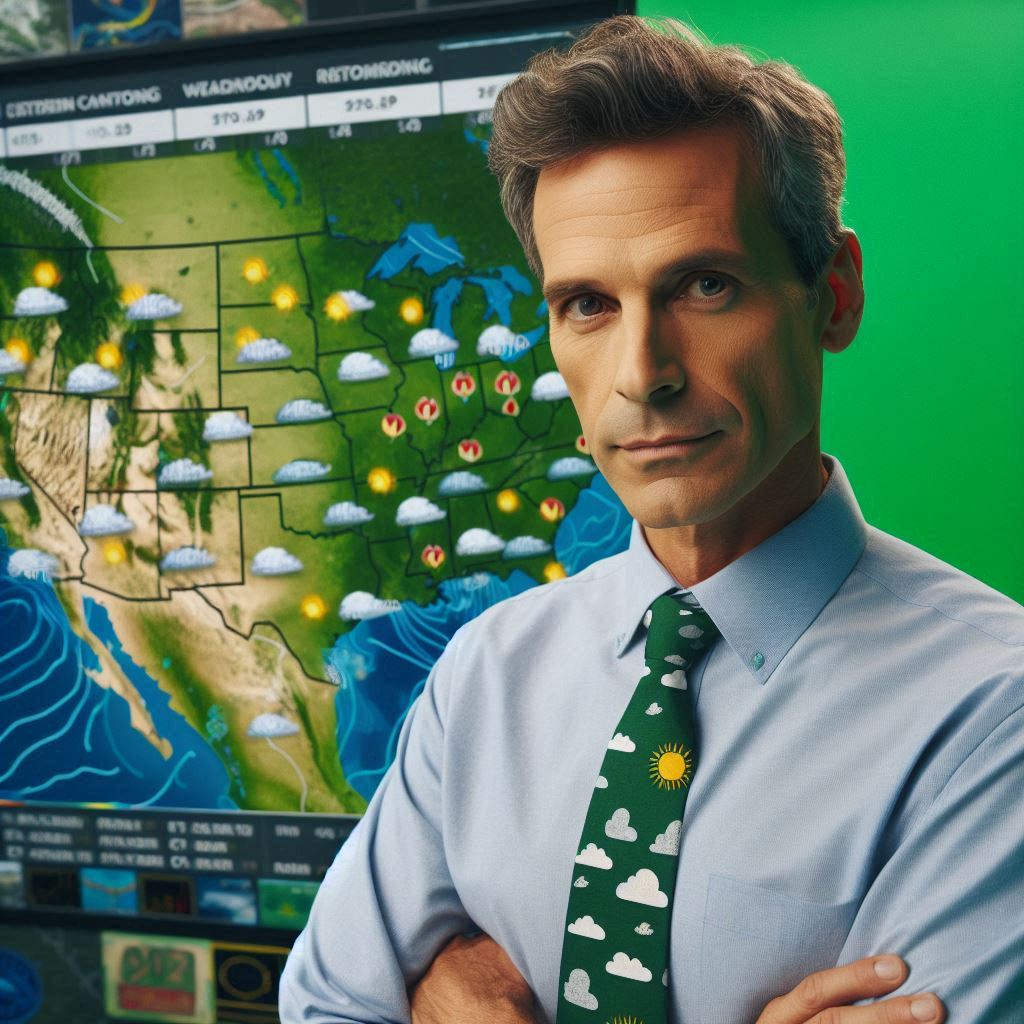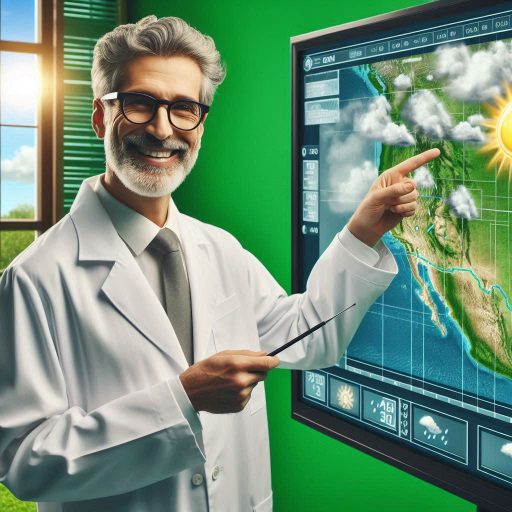Introduction
Meteorology is the scientific study of the atmosphere and its phenomena, primarily focusing on weather and climate.
It encompasses a wide range of disciplines, including physics, chemistry, and environmental science, to analyze and interpret atmospheric data.
Meteorologists employ sophisticated technology and advanced models to understand atmospheric conditions, enabling them to predict weather patterns with increasing accuracy.
This scientific endeavor is critical for daily life, as it influences everything from agricultural planning to disaster preparedness.
The importance of meteorologists cannot be overstated.
They play a vital role in forecasting weather patterns, which helps communities prepare for severe weather events such as hurricanes, tornadoes, and blizzards.
Accurate weather predictions are essential for public safety, as they provide timely warnings that can save lives and minimize property damage.
Additionally, meteorologists contribute to sectors like agriculture, where their expertise guides farmers in optimizing planting and harvesting times, ultimately affecting food supply chains.
In aviation, precise weather forecasting is crucial for flight safety, allowing airlines to plan optimal routes and avoid hazardous conditions.
Education and Training Required
To pursue a career in meteorology, a solid educational foundation is essential.
Bachelor’s Degree in Meteorology or Related Field
Most meteorologists hold a bachelor’s degree in meteorology or a closely related field.
These programs typically cover subjects like atmospheric science, physics, and mathematics.
Students gain a comprehensive understanding of weather patterns, climate dynamics, and forecasting techniques.
Many universities offer specialized programs that allow students to focus on areas of interest, such as climate change or severe weather.
It is crucial to select an accredited program to ensure a quality education.
Importance of Internships and Hands-On Experience
Internships play a vital role in a meteorology career.
They provide hands-on experience and practical skills that enhance classroom learning.
Many universities partner with weather agencies, news stations, and research organizations to facilitate internships.
Students can apply their knowledge in real-world settings during these valuable opportunities.
Internships also help students build professional networks within the field.
Networking is essential for career advancement and securing job opportunities after graduation.
It is advisable for students to seek internships early in their academic careers.
Gaining experience during college increases job prospects upon graduation.
Advanced Degrees for Specialized Roles
While a bachelor’s degree is the minimum requirement for most meteorology positions, advanced degrees can open doors to specialized roles.
A master’s degree or Ph.D. can enhance expertise in specific areas like climate modeling or atmospheric research.
These advanced degrees often involve significant research components, allowing graduates to contribute to scientific knowledge.
Some meteorologists pursue careers in academia or research, where advanced degrees are often necessary.
Many universities seek professors with doctoral degrees to teach and conduct research.
These roles typically involve mentoring students and publishing research findings.
Graduates with advanced degrees may also work for government agencies, focusing on climate research or environmental policy.
Continuous education is crucial in the ever-evolving field of meteorology.
Professionals must stay current with technological advancements and scientific discoveries.
Many organizations offer workshops, certifications, and conferences for ongoing professional development.
Networking with peers and experts can also provide insights into new trends and methods in meteorology.
Pursuing certifications, such as those offered by the American Meteorological Society, can further enhance a meteorologist’s credentials.
These certifications demonstrate a commitment to professional excellence and ongoing education.
A successful career in meteorology requires a strong educational foundation, practical experience through internships, and potentially advanced degrees for specialized roles.
With dedication and the right training, aspiring meteorologists can navigate diverse career paths and contribute significantly to the field.
Forecasting Careers
Meteorology offers diverse career opportunities, especially in forecasting.
Meteorologists play a crucial role in predicting weather patterns.
Their expertise helps individuals, businesses, and governments make informed decisions based on weather predictions.
Role of Meteorologists in Predicting Weather Patterns
Meteorologists analyze atmospheric data to understand weather systems and make forecasts.
They use various tools, including satellites, radar, and computer models, to interpret data.
By studying factors like temperature, humidity, and wind patterns, meteorologists can predict short-term and long-term weather conditions.
Their forecasts help people prepare for severe weather events, such as hurricanes, tornadoes, and floods.
Accurate predictions can save lives and minimize property damage.
Meteorologists also provide information on daily weather for local communities, ensuring that everyone stays informed about upcoming conditions.
Different Types of Forecasting Jobs
There are various forecasting jobs available in the field of meteorology.
Many meteorologists work in television and radio, delivering weather updates to the public.
They create engaging forecasts that communicate complex information clearly and understandably.
These professionals often develop strong on-air personalities and establish a rapport with viewers.
Government agencies also hire meteorologists for forecasting roles.
The National Weather Service (NWS) employs meteorologists to monitor weather systems and issue warnings.
They provide vital information to emergency services, ensuring communities are prepared for adverse weather conditions.
Additionally, government agencies may focus on climate research and policy development.
Private companies, such as airlines and agricultural firms, also seek meteorologists.
These businesses rely on accurate forecasts to make decisions that impact their operations.
For example, airlines use weather data to plan flight schedules, while farmers need forecasts to determine optimal planting and harvesting times.
Skills Needed for Success in a Forecasting Career
To succeed in a forecasting career, certain skills are essential.
Strong analytical skills are crucial for interpreting complex data sets and identifying patterns.
Meteorologists must be detail-oriented and able to work with various tools and technologies.
Effective communication skills are vital in this field.
Meteorologists need to convey technical information to diverse audiences clearly.
Whether through television, radio, or online platforms, engaging storytelling enhances the delivery of forecasts.
Adaptability is another critical skill.
Weather can change rapidly, and meteorologists must adjust their forecasts accordingly.
They should be prepared to work under pressure, especially during severe weather events.
Collaboration skills are also important.
Meteorologists often work in teams, sharing insights and expertise to improve forecasts.
Building strong relationships with colleagues fosters a supportive work environment.
Forecasting careers in meteorology are diverse and impactful.
Meteorologists play a vital role in predicting weather patterns, helping people prepare for various weather conditions.
With opportunities in television, radio, government agencies, and private companies, aspiring meteorologists can find fulfilling careers.
Developing essential skills, including analytical thinking, communication, adaptability, and collaboration, will lead to success in this dynamic field.
Read: Interdisciplinary Research: Botany and Other Sciences
Environmental Consulting
Meteorologists play a vital role in environmental consulting, helping businesses and organizations make informed decisions.
Their expertise in weather patterns and climate impacts can significantly influence various industries.
How Meteorologists Help Businesses and Organizations Make Informed Decisions
Meteorologists provide valuable insights that enable companies to assess environmental risks and opportunities.
They analyze weather data and climate trends to predict potential impacts on operations.
For instance, businesses can use this information to develop strategies that mitigate risks associated with severe weather events.
In industries like agriculture, meteorologists help farmers optimize planting and harvesting schedules based on weather forecasts.
By providing detailed climate analyses, they enable farmers to make decisions that maximize yields and minimize losses.
Similarly, in the energy sector, meteorologists assess weather patterns to forecast energy demand and production.
This information is essential for managing resources effectively.
Organizations also rely on meteorologists to assess environmental regulations and compliance.
Understanding local climate conditions helps companies navigate policies related to emissions, waste management, and resource usage.
Meteorologists can assist in conducting environmental impact assessments, ensuring businesses align with sustainability goals.
Opportunities for Consulting in Areas Like Agriculture, Energy, and Construction
There are numerous opportunities for meteorologists in environmental consulting across various sectors.
In agriculture, meteorologists can work with agribusinesses to develop climate-smart practices.
This includes advising on crop selection based on climate resilience and managing irrigation efficiently.
In the energy sector, meteorologists can help energy companies optimize their operations.
They analyze weather patterns to improve the efficiency of renewable energy sources, such as solar and wind.
By forecasting energy production, meteorologists aid in planning and managing energy resources.
The construction industry also benefits from meteorological consulting.
Meteorologists provide weather forecasts that inform project timelines and safety measures.
By anticipating adverse weather conditions, construction companies can minimize delays and protect workers.
Additionally, opportunities exist in environmental policy consulting.
Meteorologists can work with government agencies and non-profit organizations to develop strategies for addressing climate change.
Their expertise can inform policy decisions that impact public health and environmental sustainability.
Collaboration with Other Professionals in Environmental Consulting
Meteorologists often collaborate with other professionals in environmental consulting.
They work alongside environmental scientists, engineers, and policymakers to address complex environmental challenges.
This interdisciplinary approach enhances the effectiveness of consulting projects.
For example, in a project related to climate adaptation, meteorologists may team up with hydrologists to assess flood risks.
Together, they can develop comprehensive strategies that incorporate both meteorological data and hydrological modeling.
Additionally, meteorologists collaborate with ecologists to evaluate the impacts of climate change on ecosystems.
This partnership can lead to informed decision-making regarding conservation and land management practices.
Collaboration with regulatory experts is also crucial.
Meteorologists can provide data and insights that support compliance with environmental regulations, ensuring that businesses adhere to local and national standards.
Meteorologists play a critical role in environmental consulting by helping businesses and organizations make informed decisions.
Opportunities in agriculture, energy, and construction allow meteorologists to apply their expertise effectively.
Their collaboration with other professionals enhances the ability to tackle complex environmental challenges and develop sustainable solutions.
Read: Women in Botany: Celebrating Pioneers and Leaders
Research and Development
Research and development (R&D) is crucial for advancing our understanding of weather patterns and climate change.
Meteorologists play a key role in this field, contributing to scientific knowledge and innovation.
Importance of Research in Advancing Understanding of Weather Patterns
Research in meteorology enhances our comprehension of atmospheric processes and weather systems.
By studying historical data and current trends, meteorologists can identify patterns and make more accurate predictions.
This research is vital for improving forecasting models and understanding extreme weather events, such as hurricanes and droughts.
Investigating climate change impacts is another critical area of research.
Meteorologists analyze long-term climate data to assess changes in temperature, precipitation, and weather extremes.
Their findings inform public policy, environmental management, and disaster preparedness.
Through rigorous research, meteorologists help society adapt to a changing climate.
Research also drives innovation in meteorological technology.
Advances in satellite systems, radar, and computational models rely on continuous research efforts.
By developing new tools and methodologies, meteorologists enhance the accuracy and efficiency of weather predictions.
Careers in Academia, Private Research Organizations, and Government Agencies
Meteorologists have various career opportunities in academia, private research organizations, and government agencies.
In academia, they can pursue positions as professors or researchers.
These roles often involve teaching and mentoring students while conducting independent research.
Many universities also offer grants for innovative research projects, fostering an environment of academic growth.
Private research organizations, such as think tanks and consulting firms, employ meteorologists to conduct applied research.
These organizations often focus on specific industries, such as agriculture, energy, or environmental policy.
Meteorologists in these settings contribute to developing practical solutions and strategies for businesses and governments.
Government agencies, including the National Oceanic and Atmospheric Administration (NOAA) and the National Weather Service (NWS), also hire meteorologists for research roles.
These positions often involve studying weather phenomena, developing forecasting tools, and conducting climate assessments.
Working for government agencies provides opportunities to impact national policies and public safety initiatives.
Growth Potential in Research-Based Roles
The growth potential in research-based roles for meteorologists is significant.
As the demand for climate data and weather predictions increases, research positions are expected to expand.
Climate change has heightened awareness of environmental issues, leading to increased funding for research initiatives.
Meteorologists with advanced degrees, such as master’s or Ph.D. programs, will likely find more opportunities in research roles.
Advanced degrees enable them to engage in specialized studies, develop new methodologies, and lead research teams.
Additionally, professionals with strong analytical and technical skills are in high demand.
Emerging fields within meteorology, such as climate modeling and remote sensing, present exciting growth opportunities.
Meteorologists specializing in these areas will be well-positioned for careers in research and development.
Furthermore, interdisciplinary collaboration is becoming increasingly important in meteorology research.
Meteorologists will work alongside experts in fields like ecology, geology, and public health.
This collaboration will lead to innovative research that addresses complex environmental challenges.
Research and development are essential for advancing our understanding of weather patterns.
Meteorologists have diverse career opportunities in academia, private research organizations, and government agencies.
With the growing demand for climate-related research, the growth potential in research-based roles remains strong, making it an exciting field for aspiring meteorologists.
Read: How Climate Change Is Impacting Plant Research
Transform Your Career Today
Unlock a personalized career strategy that drives real results. Get tailored advice and a roadmap designed just for you.
Start Now
Climate Change Mitigation
Climate change mitigation is a critical focus for meteorologists today.
Their expertise is essential in studying and addressing the impacts of climate change on our planet.
Role of Meteorologists in Studying and Addressing Climate Change
Meteorologists play a vital role in understanding climate change dynamics.
They analyze atmospheric data to identify trends and shifts in weather patterns over time.
By studying historical climate records, meteorologists can better predict future climate scenarios and assess potential impacts on ecosystems and human activities.
In addition to research, meteorologists contribute to developing strategies for climate change mitigation.
They provide crucial data and insights that help inform policies aimed at reducing greenhouse gas emissions.
Meteorologists also work with various stakeholders to create awareness about climate issues and advocate for sustainable practices.
Their expertise is instrumental in conducting climate impact assessments.
These assessments evaluate the potential effects of climate change on agriculture, water resources, and public health.
By identifying vulnerable areas, meteorologists help communities prepare for and adapt to changing climate conditions.
Opportunities for Working on Climate Models, Sustainability Projects, and Policy Development
Meteorologists have numerous opportunities to engage in climate models and sustainability projects.
Climate modeling is a significant area of focus, allowing meteorologists to simulate future climate scenarios.
These models provide insights into how different factors, such as emissions and land use changes, can influence climate patterns.
Working on sustainability projects is another avenue for meteorologists.
They can collaborate with businesses, non-profits, and government agencies to develop sustainable practices.
This may include projects aimed at reducing carbon footprints or implementing renewable energy solutions.
Meteorologists‘ expertise helps ensure that these initiatives are based on accurate climate data.
Policy development is also a critical area where meteorologists can make a difference.
They can work with policymakers to create effective climate policies that promote sustainability and reduce environmental impacts.
By providing scientific evidence and recommendations, meteorologists can influence policy decisions at local, national, and international levels.
Impact of Climate Change on Future Career Opportunities in Meteorology
The growing focus on climate change is expected to impact future career opportunities in meteorology significantly.
As awareness of climate issues increases, the demand for climate-related expertise will rise.
Meteorologists with a background in climate science will be well-positioned for success in this evolving job market.
Various sectors will seek meteorologists to address climate change challenges.
Industries such as agriculture, energy, and urban planning will require experts to help them adapt to changing conditions.
As businesses and governments prioritize sustainability, the need for climate-savvy meteorologists will grow.
Additionally, research institutions and universities will continue to expand their climate-focused programs.
This growth will create more opportunities for meteorologists to engage in impactful research and contribute to advancements in climate science.
Furthermore, collaboration across disciplines will become increasingly important.
Meteorologists will work alongside ecologists, urban planners, and engineers to develop comprehensive solutions for climate challenges.
This interdisciplinary approach will enhance the effectiveness of climate change mitigation efforts.
Meteorologists play a critical role in studying and addressing climate change.
Their work in climate modeling, sustainability projects, and policy development opens up numerous opportunities.
As climate change remains a pressing global issue, career prospects in meteorology will continue to expand, offering exciting paths for aspiring professionals.
Read: Exploring the Different Branches of Geology
Broadcasting and Communication
Meteorologists play a vital role in broadcasting and communication, ensuring that the public receives accurate and timely weather information.
Their expertise is crucial in informing communities about weather-related events and safety measures.
Importance of Meteorologists in Communicating Weather Information to the Public
Meteorologists serve as the bridge between complex weather data and the public’s understanding.
They translate scientific information into accessible language, making it easier for people to grasp weather forecasts and potential impacts.
Effective communication is essential, especially during severe weather events like storms, hurricanes, or floods.
Meteorologists also provide essential guidance on safety precautions.
By delivering timely alerts and updates, they help communities prepare for adverse weather conditions.
This proactive approach can save lives and minimize property damage.
Their role in public safety cannot be overstated, as informed citizens are better equipped to respond to weather emergencies.
Additionally, meteorologists contribute to public awareness about long-term climate trends and environmental issues.
By discussing climate change and its implications, they encourage informed public discourse and advocacy for sustainability.
Skills Needed for Success in Broadcasting, Including Public Speaking and Media Literacy
Successful meteorologists in broadcasting need a unique set of skills.
Public speaking is one of the most critical abilities.
They must confidently present weather forecasts and convey complex information clearly and engagingly.
This skill is vital during live broadcasts, where they must think on their feet and respond to viewer questions.
Media literacy is another essential skill for meteorologists.
Understanding how different media platforms work allows them to tailor their messages for various audiences.
Whether presenting on television, radio, or social media, meteorologists must adapt their communication style to suit each platform.
This versatility enhances their effectiveness in reaching diverse audiences.
Strong analytical skills are also important.
Meteorologists must interpret data and draw meaningful conclusions quickly.
This ability enables them to provide accurate forecasts and inform the public about potential weather hazards.
Additionally, teamwork and collaboration are crucial.
Meteorologists often work alongside producers, reporters, and technical staff to create compelling broadcasts.
Building strong relationships within a newsroom fosters a collaborative environment and leads to higher-quality programming.
Growth in Opportunities for Meteorologists in Digital Media Platforms
The rise of digital media has significantly expanded opportunities for meteorologists.
With the increasing reliance on online platforms for information, meteorologists can reach a broader audience than ever before.
Social media, websites, and mobile applications have become essential tools for disseminating weather information.
Meteorologists can utilize social media to engage with the public directly.
They can share real-time updates, respond to viewer inquiries, and provide valuable tips for severe weather preparedness.
This direct communication fosters community engagement and enhances trust in meteorological expertise.
Furthermore, many news organizations have developed dedicated weather apps and websites, offering platforms for meteorologists to showcase their knowledge.
These digital tools allow meteorologists to provide in-depth analysis and personalized forecasts.
As technology continues to evolve, meteorologists who embrace digital media will find abundant opportunities.
The demand for video content is also increasing.
Meteorologists can create educational videos, webinars, and podcasts to share their expertise.
This growth in multimedia content allows meteorologists to diversify their careers and engage with audiences in innovative ways.
Meteorologists play a crucial role in broadcasting and communication, helping the public understand weather information.
Their success relies on strong public speaking skills, media literacy, and analytical abilities.
With the growth of digital media platforms, opportunities for meteorologists are expanding, allowing them to connect with audiences and provide valuable insights into weather and climate.
Risk Assessment and Disaster Response
Meteorologists are integral to risk assessment and disaster response efforts.
Their expertise helps communities prepare for and mitigate the impacts of natural disasters, ensuring public safety and resilience.
How Meteorologists Contribute to Assessing and Mitigating Risks During Natural Disasters
Meteorologists analyze weather data to assess potential risks associated with natural disasters.
They monitor atmospheric conditions, track storm systems, and predict severe weather events.
This information is vital for issuing timely warnings and alerts, allowing communities to take necessary precautions.
During a natural disaster, meteorologists provide critical insights on the storm‘s path, intensity, and expected impacts.
Their analyses inform emergency response plans, helping officials allocate resources and implement evacuation orders when needed.
By modeling potential scenarios, meteorologists can also help predict flooding, landslides, or other hazards that may arise from severe weather events.
Furthermore, meteorologists contribute to developing risk mitigation strategies.
They work with local governments and organizations to establish preparedness programs, ensuring communities are equipped to handle potential disasters.
Their recommendations often include improving infrastructure resilience, enhancing early warning systems, and conducting public education campaigns about disaster preparedness.
Career Paths in Emergency Management, Insurance, and Government Agencies
Meteorologists have diverse career paths in risk assessment and disaster response.
Many find opportunities in emergency management, where they support disaster preparedness and response efforts.
In this role, meteorologists collaborate with local, state, and federal agencies to develop comprehensive emergency plans.
They provide expertise in assessing potential risks and evaluating the effectiveness of response strategies.
The insurance industry also seeks meteorologists to analyze risks related to extreme weather events.
They assess the potential impact of natural disasters on properties and provide data to help insurers set appropriate premiums.
Their insights enable insurance companies to better understand regional vulnerabilities and develop risk mitigation strategies.
Government agencies, such as the Federal Emergency Management Agency (FEMA) and the National Oceanic and Atmospheric Administration (NOAA), employ meteorologists to support disaster response efforts.
These professionals contribute to disaster recovery planning, resource allocation, and public communication strategies.
Their expertise ensures that agencies are prepared to respond effectively to natural disasters.
Importance of Collaboration with Emergency Responders and Policymakers
Collaboration is essential for effective risk assessment and disaster response.
Meteorologists work closely with emergency responders, including firefighters, law enforcement, and medical teams.
By sharing real-time weather information, meteorologists help responders make informed decisions during emergencies.
This collaboration extends to policymakers as well.
Meteorologists provide critical data and recommendations that inform policy decisions regarding disaster preparedness and climate adaptation.
Their input is vital in shaping legislation that promotes community resilience and risk reduction.
Furthermore, effective communication between meteorologists and emergency management personnel is crucial.
Regular briefings and updates ensure that all parties remain informed about changing weather conditions.
This collaboration allows for coordinated responses and minimizes confusion during critical situations.
Public outreach is another important aspect of collaboration.
Meteorologists can help educate the public about risks and safety measures.
By working with community organizations and local governments, they can develop awareness campaigns that empower citizens to prepare for natural disasters.
Meteorologists play a crucial role in risk assessment and disaster response.
Their expertise in analyzing weather data and predicting natural disasters is essential for public safety.
With diverse career paths in emergency management, insurance, and government agencies, meteorologists contribute to creating resilient communities.
Collaboration with emergency responders and policymakers enhances the effectiveness of disaster response efforts, ultimately saving lives and minimizing property damage.
Learn More: How Nanotechnology is Shaping the Future of Healthcare
Conclusion
Meteorology offers diverse career paths that cater to various interests and skills.
Professionals in this field can specialize in forecasting, research, climatology, or atmospheric science.
Opportunities abound in sectors like agriculture, aviation, and disaster management.
Meteorologists play a crucial role in helping societies prepare for and respond to weather-related challenges.
Their expertise supports informed decision-making in agriculture, ensuring crop protection and optimal planting times.
The demand for skilled meteorologists continues to grow, especially as climate change intensifies.
This trend ensures job security and ample advancement opportunities.
Aspiring meteorologists can explore positions in government agencies, private companies, and research institutions.
Organizations often seek experts who can analyze weather data and provide actionable insights.
Pursuing a career in meteorology allows individuals to make a meaningful impact on society.
It offers a chance to improve public safety and promote environmental awareness.
If you are passionate about weather and its effects, consider this rewarding field.
The journey into meteorology promises personal growth and professional fulfillment.
You will gain valuable skills in data analysis, critical thinking, and communication.
Embrace the chance to contribute to a better understanding of our planet‘s atmosphere.
Take the first step toward a dynamic career in meteorology today!




